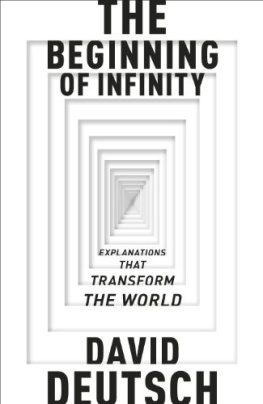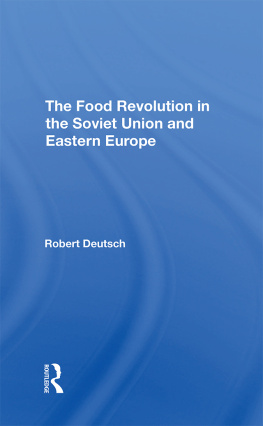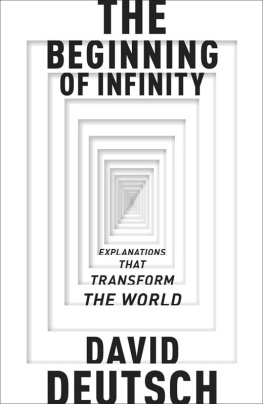Deutsch - The Beginning of Infinity: Explanations That Transform the World
Here you can read online Deutsch - The Beginning of Infinity: Explanations That Transform the World full text of the book (entire story) in english for free. Download pdf and epub, get meaning, cover and reviews about this ebook. City: London, year: 2011;2012, publisher: Penguin, genre: Romance novel. Description of the work, (preface) as well as reviews are available. Best literature library LitArk.com created for fans of good reading and offers a wide selection of genres:
Romance novel
Science fiction
Adventure
Detective
Science
History
Home and family
Prose
Art
Politics
Computer
Non-fiction
Religion
Business
Children
Humor
Choose a favorite category and find really read worthwhile books. Enjoy immersion in the world of imagination, feel the emotions of the characters or learn something new for yourself, make an fascinating discovery.
- Book:The Beginning of Infinity: Explanations That Transform the World
- Author:
- Publisher:Penguin
- Genre:
- Year:2011;2012
- City:London
- Rating:5 / 5
- Favourites:Add to favourites
- Your mark:
The Beginning of Infinity: Explanations That Transform the World: summary, description and annotation
We offer to read an annotation, description, summary or preface (depends on what the author of the book "The Beginning of Infinity: Explanations That Transform the World" wrote himself). If you haven't found the necessary information about the book — write in the comments, we will try to find it.
Bold ... profound ... provocative and persuasive. (The Economist )
Science has never had an advocate quite like David Deutsch. He is a computational physicist on a par with his touchstones Alan Turing and Richard Feynman, and also a philosopher in the line of his greatest hero, Karl Popper. His arguments are so clear that to read him is to experience the thrill of the highest level of discourse available on this planet and to understand it ...This is the great Life, the Universe and Everything book for our time and the answer is not 42: it is infinity. To understand precisely what Deutsch means by this, you will have to read him. Do so and lose your parochial blinkers forever. (Peter Forbes The Independent )
This is Deutsch at his most ambitious, seeking to understand the implications of our scientific explanations of the world ... I enthusiastically recommend this rich, wide-ranging and elegantly written exposition of the unique insights of one of our most original intellectuals. (Michael Berry Times Higher Education Supplement )
David Deutsch...may well go down in history as one of the great scientists of our age. (Andrew Crumey The Scotsman )
ReviewBold ... profound ... provocative and persuasive. The Economist Science has never had an advocate quite like David Deutsch. He is a computational physicist on a par with his touchstones Alan Turing and Richard Feynman, and also a philosopher in the line of his greatest hero, Karl Popper. His arguments are so clear that to read him is to experience the thrill of the highest level of discourse available on this planet and to understand it ...This is the great Life, the Universe and Everything book for our time and the answer is not 42: it is infinity. To understand precisely what Deutsch means by this, you will have to read him. Do so and lose your parochial blinkers forever. -- Peter Forbes The Independent This is Deutsch at his most ambitious, seeking to understand the implications of our scientific explanations of the world ... I enthusiastically recommend this rich, wide-ranging and elegantly written exposition of the unique insights of one of our most original intellectuals. -- Michael Berry Times Higher Education Supplement David Deutsch...may well go down in history as one of the great scientists of our age. -- Andrew Crumey The Scotsman
Library : General
Formats : EPUB
ISBN : 0670022756
Deutsch: author's other books
Who wrote The Beginning of Infinity: Explanations That Transform the World? Find out the surname, the name of the author of the book and a list of all author's works by series.
















